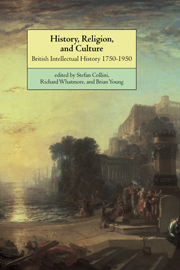Book contents
- Frontmatter
- Contents
- Preface
- General introduction
- Presentation of History, Religion, and Culture
- Part I
- Part II
- 4 ‘The Lust of Empire and Religious Hate’: Christianity, history, and India, 1790–1820
- 5 The Victorians and Oliver Cromwell
- 6 Religion and politics in the Quarterly Review, 1809–1853
- 7 Ruskin's way: tout à fait comme un oiseau
- Part III
- List of contributors
- Acknowledgements
- Index
6 - Religion and politics in the Quarterly Review, 1809–1853
Published online by Cambridge University Press: 03 December 2009
- Frontmatter
- Contents
- Preface
- General introduction
- Presentation of History, Religion, and Culture
- Part I
- Part II
- 4 ‘The Lust of Empire and Religious Hate’: Christianity, history, and India, 1790–1820
- 5 The Victorians and Oliver Cromwell
- 6 Religion and politics in the Quarterly Review, 1809–1853
- 7 Ruskin's way: tout à fait comme un oiseau
- Part III
- List of contributors
- Acknowledgements
- Index
Summary
Everyone knows that the great nineteenth-century reviews offer the historian a rich source for studying the issues which agitated the educated classes in Victorian England, and most historians now know that in the Wellesley Index we have an unrivalled guide to the identity of their anonymous authors. But their impact on the political process is still little explored. The old Namierite scepticism about the impact of theory and the theorists on politics has latterly been reinforced by an academic division of labour. Historians of politics and government already enjoy an unmanageably large range of sources. It seems quite reasonable to leave the conduct and influence of the higher journalism to students of literature. If you can study in detail the motives of men in power, why bother with those who, for all their eloquence and skill, can only comment after policy has been determined?
The answer, for the early and midnineteenth century at least, is that if one assumes such a division of functions, one is liable to miss a good deal. Politicians and men of letters mingled in the same clubs, the same salons, and the same country house parties. The reading public was small, the manipulation of opinion was still rudimentary, and a naive faith in the power of argument, and even in the effect of individual example, was widespread.
- Type
- Chapter
- Information
- History, Religion, and CultureBritish Intellectual History 1750–1950, pp. 136 - 155Publisher: Cambridge University PressPrint publication year: 2000
- 1
- Cited by



